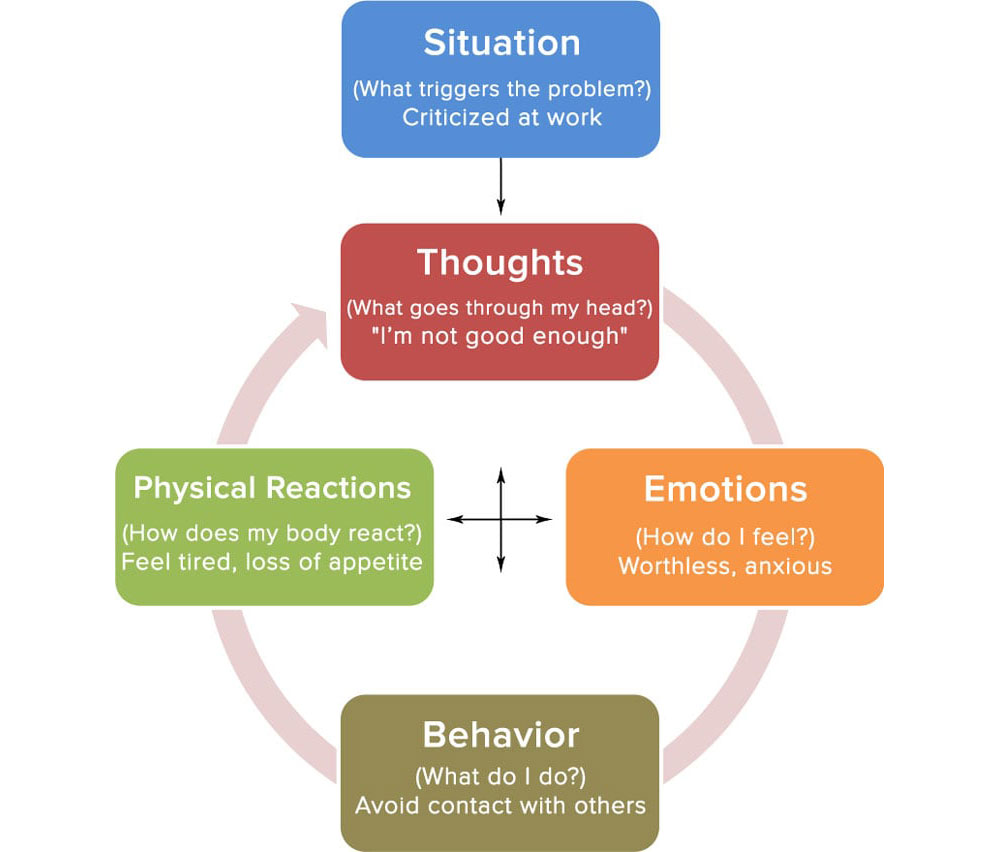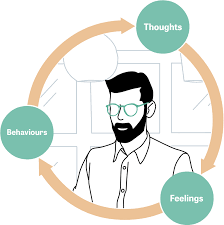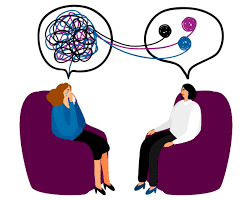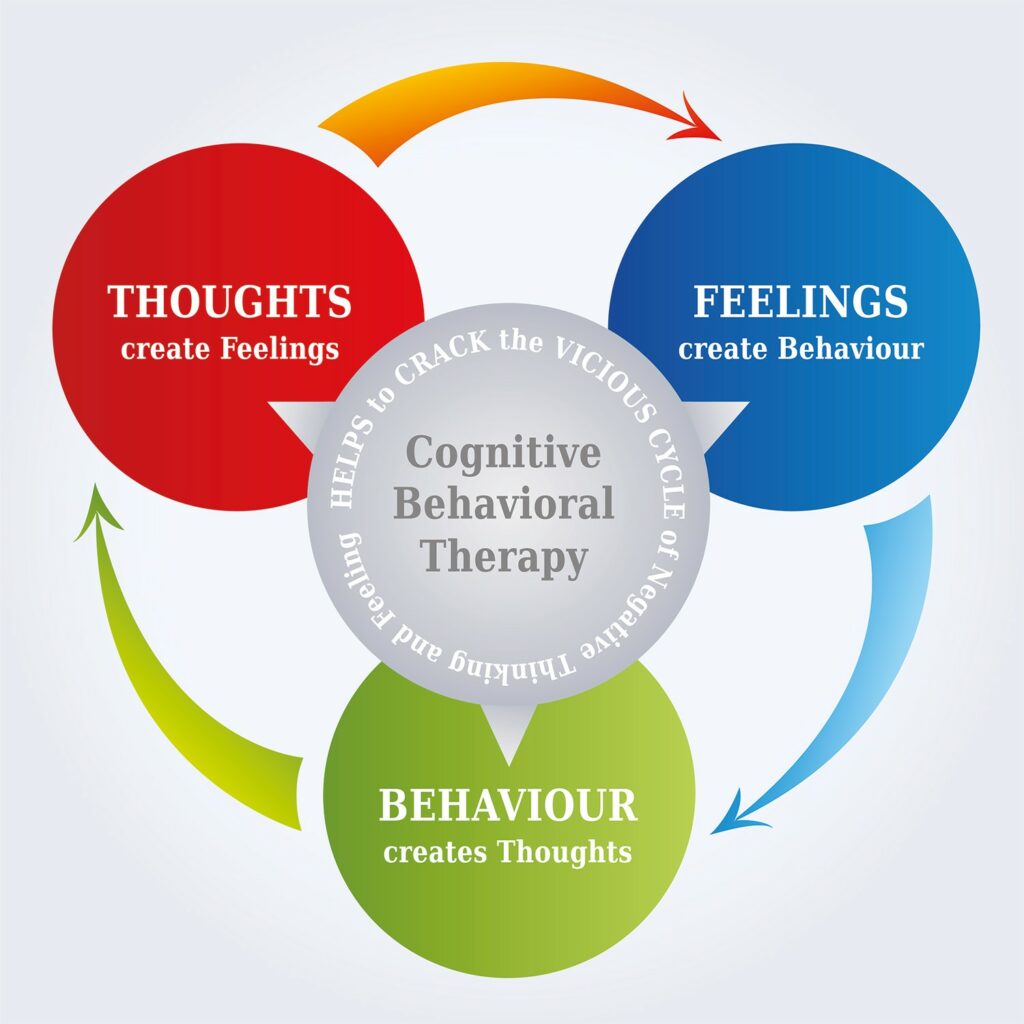Cognitive Behavioural Therapy, or CBT for short, is one of the most commonly used therapeutic interventions in the world. In this article, we will explore all of the questions related to CBT. We’ll start by discussing what this therapy is and how it works. Then we’ll look at who this therapy can help and why they might benefit from it. Finally, we’ll talk about how to find a CBT therapist and what to look out for. So let’s get started!
Contents
Understanding CBT Therapy

Cognitive Behavioural Therapy (CBT) is one of the most popular and well-researched forms of psychotherapy. It is a type of therapy that helps people understand and change the way they think about themselves, their relationships, and the world around them.
It can help with problems such as anxiety, depression, stress, and addiction. This therapy is effective in a wide range of studies and is recommended by many healthcare organizations, including the National Institute for Health and Care Excellence (NICE).
Theory Behind CBT Therapy
CBT is based on the idea that our thoughts, feelings, and behaviors are all interconnected. Our thoughts (cognitions) can affect our feelings and emotions, which in turn can affect how we behave.
For example, if you think that you are a bad person, you may feel unhappy and depressed. This could lead to you behaving in ways that confirm your negative thoughts about yourself, such as isolating yourself from others or engaging in self-destructive behaviors.
Conversely, if you think that you are a good person, you may feel happy and confident. This could lead to you behaving in ways that confirm your positive thoughts about yourself, such as being more social or engaging in healthy activities.
NOTE: This therapy helps people learn how to identify and change negative thoughts and beliefs that can contribute to problems like anxiety and depression.
History And Development
CBT was first developed in the 1960s by Dr. Aaron Beck, a psychiatrist at the University of Pennsylvania. At the time, there was very little treatment available for people with mental health disorders other than medication and electroconvulsive therapy (ECT).
Dr. Beck noticed that many of his patients with depression shared similar negative thoughts and patterns of thinking. He developed CBT as a way to help people identify and change these negative thoughts and patterns.
It has since been proven effective in treating a wide range of mental health disorders, including anxiety, depression, eating disorders, substance abuse, and more.
Unfolding CBT Therapy

CBT works by helping you change the negative thoughts and beliefs that are contributing to your problem.
Who Can It Help
It is effective in treating a wide range of mental health disorders, including:
- Anxiety disorders (such as panic disorder, phobias, social anxiety disorder, and generalized anxiety disorder)
- Depressive disorders (such as major depressive disorder and dysthymia)
- Eating disorders (such as anorexia nervosa, bulimia nervosa, and binge eating disorder)
- Substance abuse disorders (such as alcohol abuse, drug abuse, and nicotine dependence)
- Personality disorders (such as borderline personality disorder, antisocial personality disorder, and narcissistic personality disorder)
- Psychotic disorders (such as schizophrenia and schizoaffective disorder)
- Posttraumatic stress disorder (PTSD)
How Does It Work
CBT usually consists of 12-20 weekly sessions, although some people may need more or less depending on their individual needs.
During each session, you will work with your therapist to identify and change the negative thoughts and beliefs that are contributing to your problem.
You will also learn new skills and techniques to help you manage your thoughts, emotions, and behaviors.
CBT is a collaborative process, which means that you will be actively involved in your treatment.
Techniques Used In CBT Therapy
There are a variety of different techniques that can be used in CBT therapy, including:
Cognitive restructuring: This involves changing the way you think about yourself, others, and the world. For example, if you have negative thoughts about yourself, your therapist may help you to challenge these thoughts and replace them with more realistic and positive thoughts.
Exposure therapy: This involves gradually exposing yourself to the things that you are afraid of, such as heights or social situations. This can help you to overcome your fears and learn new coping skills.
Behavioral experiments: This involves testing out your beliefs to see if they are true. For example, if you believe that you will always be rejected by others, your therapist may help you to test this belief by asking someone out on a date.
Evaluating CBT Therapy

CBT is an effective treatment for a wide range of mental health disorders. However, like all treatments, it is not right for everyone.
Before you begin CBT therapy, it is important to discuss your treatment options with a qualified therapist.
Benefits of CBT
Below are some of the benefits of CBT therapy. CBT can help you –
- Overcome your fears and anxieties.
- Typically less expensive than other types of therapy.
- Change the way you think about yourself and others.
- Manage your thoughts and emotions more effectively.
- Help learn new skills and techniques that you can use to manage your thoughts, emotions, and behaviors.
Limitations of CBT
Although CBT is a highly effective treatment, it does have some limitations, including:
- Can take time (still shorter than psychoanalysis).
- Does not address the underlying causes of problems.
- Not appropriate for people with severe mental health disorders.
- Some people find it difficult to change their thoughts and beliefs.
Why Consider It
If you are struggling with a mental health disorder, CBT therapy may be the right treatment for you. Talk to your therapist about whether CBT is the right treatment for you.
Finding a CBT Therapist

If you are considering CBT therapy, the first step is to talk to a professional.
How To Find One
There are a few different ways to find a CBT therapist:
- Your doctor or mental health professional can refer you to a qualified therapist.
- You can ask your friends or family if they know of any qualified therapists.
- You can search for therapists in your area online.
- The American Psychological Association (APA) website has a searchable database of qualified therapists.
- The Anxiety and Depression Association of America (ADAA) website also has a searchable database of qualified therapists.
What To Look Out For
When looking for a CBT therapist, there are a few things to look out for. The therapist should-
- Be licensed or certified by a professional organization.
- Be able to provide references or testimonials from previous clients.
- Have experience in treating the type of disorder that you are experiencing.
Red Flags To Avoid
There are also a few red flags to watch out for when looking for a therapist. For instance, the therapist-
- Is judgmental or dismissive of your concerns.
- Is not willing to work with you on a collaborative basis.
- Force you to do anything that you are uncomfortable with.
Pursuing Training In CBT
If you are interested in pursuing training in this therapy, there are a few things to keep in mind:
- CBT is a complex treatment and it takes many years of training to become a qualified therapist.
- CBT is an evidence-based treatment, which means that it has been proven to be effective in scientific studies.
If you are considering pursuing training in this therapy:
- You may talk to a qualified therapist to learn more about the process.
- You can find information about training programs on the APA website.
- The ADAA also has a list of qualified trainers.
Hearing From Experts
Below are some quotes from experts about CBT therapy:
- “CBT is one of the most effective treatments for anxiety disorders.” – National Institute of Mental Health
- “CBT is an effective treatment for depression.” – American Psychiatric Association
- “CBT is an effective treatment for PTSD.” – Department of Veterans Affairs
Case Study
Below is a case study of someone who has benefited from CBT therapy:
John was diagnosed with anxiety disorder. He was struggling to cope with his symptoms and was finding it difficult to function in his everyday life. John’s therapist recommended CBT therapy. After completing treatment, John reported a significant reduction in his anxiety symptoms. He was also able to return to work and resume his normal activities.
Resources
Below are some resources that can help you learn more about CBT:
- The National Institute of Mental Health has a website dedicated to CBT therapy.
- The American Psychological Association has a website devoted to CBT therapy.
Conclusion
CBT therapy is an effective treatment for a wide range of mental health disorders. If you are considering CBT, talk to your therapist about whether it is the right treatment for you.
A Word From Therapy Mantra
Your mental health — Your psychological, emotional, and social well-being — has an impact on every aspect of your life. Positive mental health essentially allows you to effectively deal with life’s everyday challenges.
At TherapyMantra, we have a team of therapists who provide affordable online therapy to assist you with issues such as depression, anxiety, stress, workplace Issues, addiction, relationship, OCD, LGBTQ, and PTSD. You can book a free therapy or download our free Android or iOS app.


